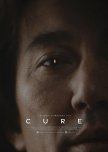Who are you - the question we don’t have an answer to.
Realistically speaking, I understood around 80% of the movie. There are many things that are just hinted at, especially about the details of the resolutions/conclusions. Does it bother me? No. If anything, it makes me more interested in potential rewatch to see if I missed anything. The movie presents a lot of questions, but not all the answers.
How much do we change and curate ourselves to match social expectations and responsibilities set by the roles we decide to take? On the other hand, is following our desires the true freedom or just another cage? Driven by desires or led by society - where is the freedom in both, where is the place for personal choices?
These are the questions I kept thinking about while watching Cure. It also reminded me that we as humans love to simplify everything - binary thinking is easier. Extreme solution to mundane problems - that’s how I saw the freedom Mamiya was spreading. Momentary freedom that led to more restraints. Because living is not as simple as always doing what others expect you to do, nor is it simply following your current needs. Forcing others to adhere to your narrow definition of freedom is not setting them free, it’s just taking the leash in your own hands and controlling them by your own standards.
Cure is a great psychological mystery that masterfully crafts the tension. The longer I watched, the more I wanted to get the answers, but by the end, I was fine with still wondering. Strangely it felt as if I was given the freedom to find my own conclusion. It’s not a typical crime movie where we want to know who did it. Rather, we desperately try to figure out why it was done. It’s slow and atmospheric.
With a script like that you need charismatic actors to pull it off. And I was blessed with Yakusho Koji’s performance as Takabe Kenichi - a detective and husband, who struggles with maintaining these two roles, slowly cracking under the pressure. Hagiwara Masato as Mamiya Kunihiko was simply terrifying. Something about that detached, but piercing presence made me feel extremely uncomfortable.
Editing and production was truly perfect. From longer and uncut scenes that created the tension, or the quick cut flashes of moments and frames, that in addition to giving important clues, served as a good indicator of the shift of perspective and the connections the main lead made.
Overall, highly recommend to all the folks who liked to be asked questions and not get conclusive answers, making your own brain do the work. Less investigation, more philosophical. Slow pace might deter some people from watching - proper watching conditions might be the key to enjoyment.
How much do we change and curate ourselves to match social expectations and responsibilities set by the roles we decide to take? On the other hand, is following our desires the true freedom or just another cage? Driven by desires or led by society - where is the freedom in both, where is the place for personal choices?
These are the questions I kept thinking about while watching Cure. It also reminded me that we as humans love to simplify everything - binary thinking is easier. Extreme solution to mundane problems - that’s how I saw the freedom Mamiya was spreading. Momentary freedom that led to more restraints. Because living is not as simple as always doing what others expect you to do, nor is it simply following your current needs. Forcing others to adhere to your narrow definition of freedom is not setting them free, it’s just taking the leash in your own hands and controlling them by your own standards.
Cure is a great psychological mystery that masterfully crafts the tension. The longer I watched, the more I wanted to get the answers, but by the end, I was fine with still wondering. Strangely it felt as if I was given the freedom to find my own conclusion. It’s not a typical crime movie where we want to know who did it. Rather, we desperately try to figure out why it was done. It’s slow and atmospheric.
With a script like that you need charismatic actors to pull it off. And I was blessed with Yakusho Koji’s performance as Takabe Kenichi - a detective and husband, who struggles with maintaining these two roles, slowly cracking under the pressure. Hagiwara Masato as Mamiya Kunihiko was simply terrifying. Something about that detached, but piercing presence made me feel extremely uncomfortable.
Editing and production was truly perfect. From longer and uncut scenes that created the tension, or the quick cut flashes of moments and frames, that in addition to giving important clues, served as a good indicator of the shift of perspective and the connections the main lead made.
Overall, highly recommend to all the folks who liked to be asked questions and not get conclusive answers, making your own brain do the work. Less investigation, more philosophical. Slow pace might deter some people from watching - proper watching conditions might be the key to enjoyment.
Considerați utilă această recenzie?


 158
158 373
373 96
96























